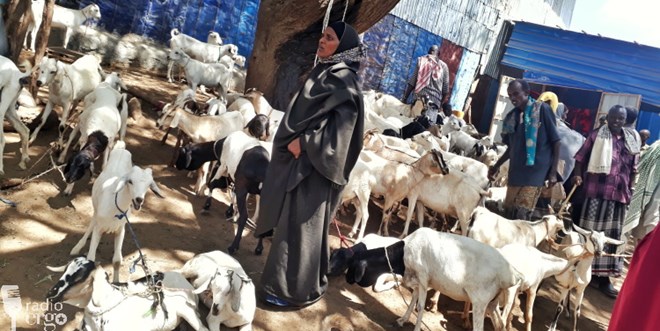
Tuesday October 19, 2021

IDP women in Luq join livestock trade as food aid stops/Mohamoud Abdirashid Abdi/Ergo
(ERGO) – Saqo Ali Ibrahim could not afford to sit idle when food aid stopped being delivered to her IDP camp in Lug, southern Somalia’s Gedo region, so she borrowed money and launched into the male-dominated livestock trade.
“If you sit at home, you won’t get anything, right? But when you make efforts, you get something. The little I get from here is enough to feed my family,” she said.
Dozens of IDP women in Luq have also gone into the livestock trade. Food aid distributions from both World Vision, and Trócaire via local NGO Somali Humanitarian Relief Action (SHRA), ceased in 2020 due to COVID19 restrictions.
Saqo’s elderly husband does not work so she was forced to step up to support their six children. She is now making a decent 40,000 to 70,000 Somali shillings ($1.48-$2.5) a day selling goats, which enables her to cook twice a day.
“The main market is far from our home, so we buy the goats from the vehicles that transport them from the rural areas to this small livestock market. We sell at a profit of 20,000-40,000 Somali shillings per goat. If there is no market, we take the goat home and feed it before bringing it back the next day for sale,” she explained.
Saqo, who lives in Kulmiye IDP camp, two kilometres from Luq town, walks for over an hour every morning to the livestock market. Adapting to the work was not hard for her as she comes from a pastoralist community in Dheeka, in Somali region of Ethiopia, where conflict between Oromo and Somali communities forced them to flee.
However, in the last two months, there has been a drop in livestock sales and prices in Luq due to the heavy consequences of prolonged drought in the region.
Saqo borrowed 1.4 million Somali shillings ($51.8) from Dubad Hassan, who has been a broker in the market for seven years. Dubad has lent four women including Saqo a total of 7,573,500 Somali shillings ($280) in the last two months to keep their businesses going. One of the women has repaid the 1,620,000 Somali shillings ($60) she borrowed but the rest still owe him.
“The women have approached us seeking our help. We introduced them to the livestock trade as the casual jobs they used to do were disrupted by COVID19. I don’t pressure them to repay my loans as the market is slow now,” he said.
Halimo Ali, another newcomer to the livestock trade, said she buys three goats every morning and sells at a profit of one dollar per goat. She is managing to cook her nine children two meals a day and has enrolled four of them in Koranic school, paying $16 in monthly fees.
“When the food aid stopped, life became tough. I used to cook one meal for my children, but since I joined this trade, my life has changed for the better,” she said.
However, Halimo, a widow, said she will quit the trade if the food aid distribution restarts as she has no one to look after her young children while she is out at the livestock market.
“My children get into fights with other children while I am busy at the market. Sometimes they are beaten, sometimes they beat other people’s children. I was forced into this trade because I have nothing to cook for my children,” she said.